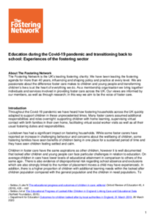Introduction
Throughout the Covid-19 pandemic we have heard how fostering households across the UK quickly adapted to support children in these unprecedented times. Many foster carers assumed additional responsibilities and roles overnight: supporting children with home learning, supervising virtual contact with birth families in their own home, facilitating virtual social worker visits as well as all their usual fostering duties and responsibilities.
Lockdown has had a significant impact on fostering households. While some foster carers have reported an increase in challenging behaviour and concerns about the wellbeing of children, some fostering families have seen benefits of children being in one place for a sustained period of time and they have seen children feeling settled and calm.
Children in foster care have the same aspirations as other children, however it is well documented that looked after children and young people can face particular challenges in relation to education. On average children in care have lower levels of educational attainment in comparison to others of the same age. There is also evidence of disproportional risk regarding school absence and exclusions which are also strongly linked to the number of placement moves a child may have experienced. In addition, there is a higher proportion of children with additional learning needs within the looked after children population compared with the general population and the children in need population. To address this, looked after children across the UK should have individualised education plans and additional funding is provided to schools to support their learning.
To understand more about fostered children’s experiences of education during the pandemic we launched a rapid response survey for foster carers and fostering services across the UK. The survey results have helped provide an understanding about both the educational experience of fostered children during lockdown and their needs as they transition back to school.

